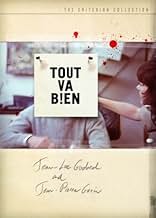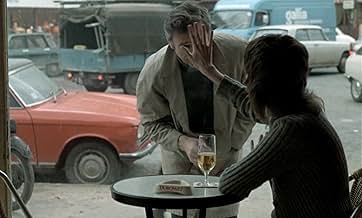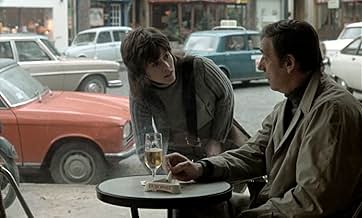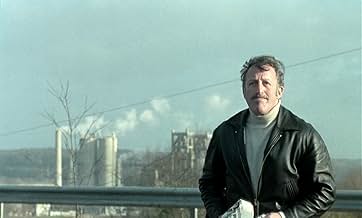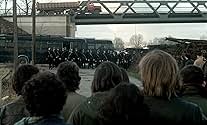IMDb-BEWERTUNG
6,5/10
4047
IHRE BEWERTUNG
Godard untersucht die Struktur von Filmen, Beziehungen und Revolutionen durch das Leben eines Paares in Paris.Godard untersucht die Struktur von Filmen, Beziehungen und Revolutionen durch das Leben eines Paares in Paris.Godard untersucht die Struktur von Filmen, Beziehungen und Revolutionen durch das Leben eines Paares in Paris.
- Regie
- Drehbuch
- Hauptbesetzung
- Auszeichnungen
- 1 wins total
Louis Bugette
- Georges
- (as Bugette)
Yves Gabrielli
- Léon
- (as Yves Gabrieli)
Empfohlene Bewertungen
Godard builds his films from scratch. It's not that he shows up on the first day of shooting with no script or idea of what he wants. He simply works from an entirely different angle than most other directors. In an inventive, cerebral, pretentious manor, Godard and his co- director here, Jean-Pierre Gorin, shows us scene after scene. After each one, we naturally ask ourselves questions pertaining to the characters and the story. The story, or should I say the film, unravels further. We then not only ask ourselves the expected question, "What does this movie mean?" We also ask ourselves, "What is this movie about?" Godard drops characters and settings into a stirring pot, sprinkling it with title cards and captions, then pours them all into the oddly shape bowl of a film structure that he has fashioned himself. His cinematic expression is less a communication to and more a confrontation with the audience. He does not make his film easy on you. Still, his cinematography is interesting, and I admire some of his ideas.
Have I made it unclear where Tout Va Bien stands in my opinion? OK. Well, let me tell you that it is quite an interesting film, an especially unpredictable one, yet Godard and Gorin, as the occasional European filmmaker will do, just as Haneke does, enjoy the feeling of being beyond the audience. What is said with Tout Van Bien, politically, socially, sexually, is expressed as if we, the audience, are the ignorant ones he is in disagreement with.
The high points of this film are the presence of Jane Fonda and a very very long sideways steadicam shot that slowly moves from left to right repeatedly across several check-out lines in a grocery store as tension and rage slowly builds.
Have I made it unclear where Tout Va Bien stands in my opinion? OK. Well, let me tell you that it is quite an interesting film, an especially unpredictable one, yet Godard and Gorin, as the occasional European filmmaker will do, just as Haneke does, enjoy the feeling of being beyond the audience. What is said with Tout Van Bien, politically, socially, sexually, is expressed as if we, the audience, are the ignorant ones he is in disagreement with.
The high points of this film are the presence of Jane Fonda and a very very long sideways steadicam shot that slowly moves from left to right repeatedly across several check-out lines in a grocery store as tension and rage slowly builds.
After his four-year, self-imposed Maoist/nihilist "exile," Godard made a temporary -- albeit slight -- overture toward conventional commercial (or "bourgeois," as Godard called it) cinema by combining a leftist political essay with a dissection of human interaction. Alas, the film fails on both these levels; as a study of the male-female relationship, it is nowhere near "Contempt" and "Masculin-Feminin"; as a pure Maoist political tract, it is shallow and mind-numingly boring compared to "Le Gai Savior" and "Vladimir and Rosa." Nevertheless, "Tout va bien" is nonetheless important within Godard's extraordinary body of work, for it marked the beginning of the seven-year process in which his films would gradually shed their ultra-leftist leanings and move towards more universal, humanistic themes, a process that would ultimately cumulate in the excellent "Every Man For Himself." Even true Godard aficionados will be as bored as everyone else, but they should nonetheless go out of their way to secure a copy.
Jean-Luc Godard's follow-up to the ultra-Maoist Weekend, featuring Yves Montand as a former New Wave filmmaker and his wife Jane Fonda, as they become active in a factory takeover. The film is of course very sympathetic to Marxism and perhaps Leninism, but it's certainly toned down from the blood fest that is Weekend, perhaps regrettably. Godard insists on reinterpreting and imposing entirely new ideas about what a film can and ought to be, in this case an intellectualized espousal of the working class struggle. A few moments of daring misce-en-scene are worth mentioning; fist, Godard includes an awesome cutaway of the factory to reveal the power-dynamics of the uprising within, and an elaborate tracking sequence in a supermarket to reveal the gross stupidity of capitalist consumerism. Tout Va Bien is clearly a step-down from Godard's brilliant features of the 60's, but it's still provocative and worth any cinephile's time.
The first film I see from Godard. Absolutely astonishing! Conversational and narrative experiments that I now see as the origins of my favorites from Hal Hartley.
Framed by the conversation of a wannabe filmmaker to his friend, where they develop an outline for a story, is a film about love and revolution. Yes, it's French. Questions raised: can love survive relationship? Can revolutionary thought survive revolution? Is it any good?
I don't know where it comes from, how it gets through, but one can sense much love for all the director's characters, for people and for film. Love and compassion.
The last fifteen minutes of the film are among the most beautiful moments I have witnessed in cinema.
Framed by the conversation of a wannabe filmmaker to his friend, where they develop an outline for a story, is a film about love and revolution. Yes, it's French. Questions raised: can love survive relationship? Can revolutionary thought survive revolution? Is it any good?
I don't know where it comes from, how it gets through, but one can sense much love for all the director's characters, for people and for film. Love and compassion.
The last fifteen minutes of the film are among the most beautiful moments I have witnessed in cinema.
From the first credit sequence, Godard captures a realistic storyline in a formalistic fashion. Although these two schools are commonly combined, in Tout va bien they frequently contrast. From the credits at the start the viewer is introduced to the process of making a film, the sound of the clapperboard is followed by an unidentified hand signing off the costs of the film, normally invisible to an audience. The formalism is not particularly abstract but more utilitarian, whether the personal views of the workers are being recorded or two storeys of the factory are shown simultaneously, the viewer is constantly reminded of the artificiality of what is being put in front of the camera in these scenes. In addition to the formalistic shooting, there are strong elements within the storyline that detract from the seriousness of the situation. The comedy with the factory owner's desperate search for a toilet and the prescribed pattern of two lovers falling out and getting back together damage the credibility of the documentary-style scenes. With these constant reminders, it is hard to treat any of the action as real or serious; the revolution in the supermarket seems childish and futile, especially as it takes such a long time for the dreary process of shopping to be converted into a vibrant revolution; the chanting by the strikers also seems unnaturally orchestrated and weak. Symbolism is understated but the blue in the sausage factory seems important as every surface is being painted. In film this colour is associated with subdued emotions, it isn't a fiery colour of revolution but a cool, stable colour, even at its most vivid. Other recurring symbols might include the police, who are labeled as fascists and so on, dressed in black overcoats, dehumanised, until one policeman is turned from pursuer into pursued, again perhaps a comic moment and one that could be stretched to symbolise the brief glory of Mai '68. In general though, the large numbers of police imply a zero-tolerance approach to dissenters that coincides with the small numbers who turn out to demonstrate showing the trend to abandon the picket line in favour of earning a living.
Godard has his main character speak directly to the camera of the feeling of dejection and missed opportunities that followed Mai '68. The candid expressions and the direct address give a warm, honest feel to the character that encourages sympathy; we are expected to agree with what he says. Following Mai '68 a cross-section of society seemed to support widespread social change, workers felt that their voice would be heard and an enormous feeling of euphoric empowerment was experienced. Following those events, the C.G.T leadership as well as the communist party seemed to abandon the cause of the ouvriers taking up contradictory positions of passive acceptance. The issues that remained a problem went unresolved whilst the energy was gradually sapped out of those willing to protest until they became marginalised and unpopular. This is expressed by the loneliness of the strikers, the pettiness of the student rioters, and the way that when the rioters clash with the police they are inevitably outnumbered: society no longer has any time for them; they have become nothing more than a nuisance. This leads to the political leaning of the film. Aside from the fascist police, the right, exemplified by the factory owner are broadly ridiculed. Even the radio station where Jane Fonda works is clearly put in the wrong by the film. Sympathy is felt for the workers but they don't seem to have any particular ethos, certainly gauchistes aren't glorified in any sense. The only support politically seems to be given to the spontaneous and apparently anarchic students but there is no sense of moral resolution in their favour, on the contrary the ultimately inconsequential nature of their protest encourages the same cynicism that was reserved for the other political stances represented in the film. All this is contributes to the overall impression given off by the film, that of ennui. Many of the other comments posted have picked up on the boredom inspired by the film but I would differentiate between the two. Ennui being a French word, and one that has been explored by the greatest authors in French literature, it is not surprising that one of the greatest multimedia essayists in the world, who also happens to be French, should explore ennui in another medium. The difference between French ennui and English boredom is that ennui carries with it an enormous sense of frustration. The two C.G.T cronies are expressive of boredom as they wait for their spokesman to finish his lengthy speech; the censorship of Jane Fonda's character, the isolation of the factory strikers, the sleaziness of Yves Montand's rotting career, in fact the feeling of disinterest inspired by most of the scenes, these encompass ennui. If it can be assumed that Godard took the usual degree of care in making this film, then it must be the case that the drawn out shots in the factory and the supermarket that seemed to express ennui most clearly are deliberate. Whether this is sufficient defence for a film that flopped at the box-office is debateable. Nevertheless if Godard's intention was to portray a situation devoid of inspiration and where hope cannot extend beyond a fragile personal relationship, then his film has succeeded.
Godard has his main character speak directly to the camera of the feeling of dejection and missed opportunities that followed Mai '68. The candid expressions and the direct address give a warm, honest feel to the character that encourages sympathy; we are expected to agree with what he says. Following Mai '68 a cross-section of society seemed to support widespread social change, workers felt that their voice would be heard and an enormous feeling of euphoric empowerment was experienced. Following those events, the C.G.T leadership as well as the communist party seemed to abandon the cause of the ouvriers taking up contradictory positions of passive acceptance. The issues that remained a problem went unresolved whilst the energy was gradually sapped out of those willing to protest until they became marginalised and unpopular. This is expressed by the loneliness of the strikers, the pettiness of the student rioters, and the way that when the rioters clash with the police they are inevitably outnumbered: society no longer has any time for them; they have become nothing more than a nuisance. This leads to the political leaning of the film. Aside from the fascist police, the right, exemplified by the factory owner are broadly ridiculed. Even the radio station where Jane Fonda works is clearly put in the wrong by the film. Sympathy is felt for the workers but they don't seem to have any particular ethos, certainly gauchistes aren't glorified in any sense. The only support politically seems to be given to the spontaneous and apparently anarchic students but there is no sense of moral resolution in their favour, on the contrary the ultimately inconsequential nature of their protest encourages the same cynicism that was reserved for the other political stances represented in the film. All this is contributes to the overall impression given off by the film, that of ennui. Many of the other comments posted have picked up on the boredom inspired by the film but I would differentiate between the two. Ennui being a French word, and one that has been explored by the greatest authors in French literature, it is not surprising that one of the greatest multimedia essayists in the world, who also happens to be French, should explore ennui in another medium. The difference between French ennui and English boredom is that ennui carries with it an enormous sense of frustration. The two C.G.T cronies are expressive of boredom as they wait for their spokesman to finish his lengthy speech; the censorship of Jane Fonda's character, the isolation of the factory strikers, the sleaziness of Yves Montand's rotting career, in fact the feeling of disinterest inspired by most of the scenes, these encompass ennui. If it can be assumed that Godard took the usual degree of care in making this film, then it must be the case that the drawn out shots in the factory and the supermarket that seemed to express ennui most clearly are deliberate. Whether this is sufficient defence for a film that flopped at the box-office is debateable. Nevertheless if Godard's intention was to portray a situation devoid of inspiration and where hope cannot extend beyond a fragile personal relationship, then his film has succeeded.
Wusstest du schon
- WissenswertesMost of the shots contain all the three colours of the French flag: blue, white and red.
- Zitate
Narrator: There'd be farmers who farm. Workers who work. And bourgeois who bourgeois.
- VerbindungenEdited into Bande-annonce de 'Tout va bien' (1972)
- SoundtracksIl y a du Soleil sur la France
Music by Eric Charden
Lyrics by Frank Thomas and Jean-Michel Rivat
Performed by Stone et Charden
Top-Auswahl
Melde dich zum Bewerten an und greife auf die Watchlist für personalisierte Empfehlungen zu.
- How long is All's Well?Powered by Alexa
Details
- Laufzeit1 Stunde 35 Minuten
- Sound-Mix
- Seitenverhältnis
- 1.66 : 1
Zu dieser Seite beitragen
Bearbeitung vorschlagen oder fehlenden Inhalt hinzufügen

Oberste Lücke
By what name was Alles in Butter (1972) officially released in Canada in English?
Antwort
